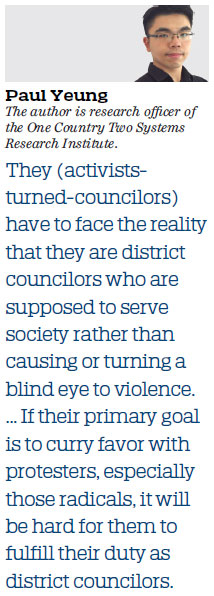Community members must keep an eye on new district councilors
Updated: 2019-11-29 07:53
By Paul Yeung(HK Edition)
|
|||||||
It is fortunate that the sixth-term District Council elections were peacefully conducted. The results surprised many, with the opposition camp pocketing 392 of the 452 seats up for grabs. But the significance of the results goes beyond this.
To start with, a total of 2.94 million registered electors cast their votes in the election, representing a record-high cumulative turnout rate of about 71.2 percent. Such unprecedented public participation is by no means an accident. Nearly 3 million voters used their ballots to demonstrate their wish to express their views via peaceful means, instead of through the street violence that has rocked the city for almost six months.
Weeks before the election, people were still worried that continual violence could derail the election. Thanks to the effective police deployment, radicals were not given any chance to disrupt the balloting process. It is worth mentioning that even opinion leaders from the opposition camp were opposed to any violence before the election took place. A rare peaceful day on Sunday showed that they have a significant stake in maintaining public order and that they are capable of helping to stop violence but haven't done so over the past six months. They should continue to make an effort to stop violence in response to the popular will.
Secondly, the election results have not much to do with merits. Some candidates from the pro-establishment camp who excelled in their community work have lost to self-proclaimed "pan-democrats", who lack experience in this area. Indeed, it is not surprising that many voters treat this election as a kind of "protest vote" or a "referendum" over the protest campaign. Therefore, the election results to a large degree do not reflect the efforts of candidates who have been serving their districts for many years.

Meanwhile, the word "referendum" may well be a misnomer. In a genuine referendum, the percentage of votes obtained matters much more than the number of seats attained by each political party or individual. Take a look at the total ballots cast: The opposition camp pocketed 52 percent of the votes, whereas the pro-establishment bloc obtained 41 percent. Consequently, the public could be misled to think that the opposition had a "landslide victory" by just referring to the number of seats they got. In absolute numbers of votes won, the opposition camp was far from achieving a "landslide victory".
If we further analyze the ratio, it is reasonable to say that the 41 percent of voters who voted for pro-establishment candidates are opposed to violence and support the government's actions against it. The 52 percent could be broken down to anti-government radicals, disgruntled voters and those who blame the government for failing to restore peace for months. It is important for the government and the pro-establishment camp to have an in-depth analysis of that combination.
After the Sunday election, many more members of the opposition camp, including those who acquiesce to radical protests, are now included into the political institution. With 17 out of 18 districts under the control of the opposition camp, the public will have a valuable chance to assess what those activists-turned-councilors can do for their respective communities. At the very least, they have to face the reality that they are district councilors who are supposed to serve society rather than causing or turning a blind eye to violence.
According to Article 97 of the Basic Law, a District Council is "not (one of the) organs of political power" but was established to "be consulted by the government of the Region on district administration and other affairs." The primary role of the district councilors is, in essence, to conduct public consultations and faithfully convey the views of people from all walks of life, instead of merely expressing the views of protesters. Councilors from the opposition camp will face the principal-agent problem as they are elected in a "protest vote". If their primary goal is to curry favor with protesters, especially those radicals, it will be hard for them to fulfill their duty as district councilors. For instance, how will they restore peace if they refuse to repudiate the rioters who have brought destruction to the community? Would they take action to stop those radicals from creating chaos in their districts? We will have to wait and see, as these newly elected district councilors will be under the watchful eye of the public.
The great American president Abraham Lincoln said, "If you want to test a man's character, give him power." Now the opposition camp has ascended to power in the District Council, the real test has just begun, and sooner or later the public will be able to distinguish whether they are catering to the interests of protesters or acting for the benefit of the community. A suggestion for the public would be requesting them to organize public dialogues to engage different voices in the community to iron out the current chaos as soon as possible.
The views do not necessarily reflect those of China Daily.
(HK Edition 11/29/2019 page11)